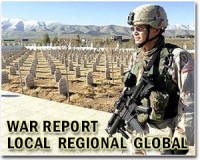| . |  |
. |
Ramallah, West Bank (UPI) Mar 22, 2009 Israeli soldiers killed four Palestinians in the West Bank, two of them after a clash with Jewish settlers at a water well, stoking fears that a new Palestinian uprising is in the offing. These concerns have been heightened by the swelling political crisis between Israeli Prime Minister Binyamin Netanyahu's government and the U.S. administration of President Barack Obama over settlement building in the West Bank. The weekend killings took place near the city of Nablus, a longtime flash point in the northern sector of the West Bank. Differing accounts of how the killings occurred have inflamed Palestinian anger. The Israeli military says two 17-year-old farmhands were shot Saturday when they threatened troops with a pitchfork and an ax. Palestinian officials say the teenagers were shot as they sat on the ground in army custody. The army claimed that two other teenagers at the water well were shot with rubber bullets. But the Israeli human rights organization B'Tselem says the troops used live rounds and provided X-rays showing a bullet lodged in the skull of one of the youngsters. Such contradictory accounts of similar incidents over the years have triggered wider spasm of violence. But what makes the weekend killings so inflammatory is that they occurred amid a surging groundswell of frustration and anger on both sides. The Palestinians, fearing that their dream of establishing a state of their own is rapidly fading, have repeatedly clashed with Israeli security forces and settlers in recent weeks. The Israeli government's blunt refusal to halt settlement expansion, particularly in East Jerusalem, which the Palestinians want as their capital, has infuriated the Palestinians. The Israeli takeover of two biblical shrines in the West Bank that are holy to both Jews and Muslims, in February has only fanned the flames and drawn international condemnation. For their part, hard-liners among the estimated 430,000 West Bank settlers, determined to resist any effort to remove them as part of a peace agreement, have been storming into Palestinian areas demanding the right to pray at ancient, long-abandoned synagogues. Jerusalem, the third most sacred site in Islam and which Israel has claimed as its indivisible and eternal capital since capturing the eastern sector in 1967, has become the flash point of the rage seething on both sides. It has been seen from earlier outbreaks of major violence that once East Jerusalem becomes a battleground Palestinian unrest can spread extremely quickly. The Obama administration, its renewed peace effort in tatters in the face of Israeli defiance, is increasingly seen as weak and unable to make Netanyahu and his right-wing allies bow to its demands. "The Israeli government believes it can use its influence in the U.S. Congress, where elections are due in November, to prevent any substantive pressure," says George Giacaman, a political science professor at Birzeit University in the West Bank. The tempo of clashes has picked up significantly in recent weeks. Last week the Israeli military sealed off the West Bank for five days. Dozens of Palestinians were arrested, while Muslims were forbidden to enter the compound of the al-Aqsa Mosque in East Jerusalem. Ziad Hammouri, director of the Jerusalem Center for Social and Economic Rights, said he believes that in this tinderbox atmosphere another Palestinian intifada, or uprising, is inevitable unless action is swiftly taken to defuse the swelling crisis. The first intifada against Israeli occupation erupted Dec. 8, 1987, and lasted until the Oslo Peace Accords were signed in 1993. Hundreds of Palestinians were killed. The second intifada broke out Sept. 28, 2000, when right-wing Israeli icon Ariel Sharon entered the Haram al-Sharif, the sacred Muslim area in East Jerusalem that houses the al-Aqsa Mosque. It petered out after much death and destruction, including a wave of Palestinian suicide bombings in Israeli cities, in 2005 when both sides were exhausted by the carnage. The shootings by the Israeli army in Nablus over the weekend have worsened an already bad situation and if more such killings take place, it could well ignite a major conflagration. The first intifada began in Gaza's Jabalia refugee camp when four Palestinians were killed by an Israeli motorist at the Erez Crossing and rumors swiftly spread that the road accident was a deliberate act of revenge for the fatal stabbing of an Israeli several days earlier. In the current short-fuse climate, that may be all it will take to unleash a new torrent of bloodshed.
Share This Article With Planet Earth
Related Links
 Pro-Israel meeting airs feared scars in US-Israel ties
Pro-Israel meeting airs feared scars in US-Israel tiesWashington (AFP) March 21, 2010 A pro-Israel conference opening Sunday exposed fears that a row over Jewish settlements had left scars in US-Israeli ties and raised the risk of Israeli strikes against Iran's nuclear program. But Israeli Prime Minister Benjamin Netanyahu - while he visits Washington this week for the American Israel Public Affairs Committee (AIPAC) three-day annual policy conference - is now to meet Presi ... read more |
|
| The content herein, unless otherwise known to be public domain, are Copyright 1995-2010 - SpaceDaily. AFP and UPI Wire Stories are copyright Agence France-Presse and United Press International. ESA Portal Reports are copyright European Space Agency. All NASA sourced material is public domain. Additional copyrights may apply in whole or part to other bona fide parties. Advertising does not imply endorsement,agreement or approval of any opinions, statements or information provided by SpaceDaily on any Web page published or hosted by SpaceDaily. Privacy Statement |